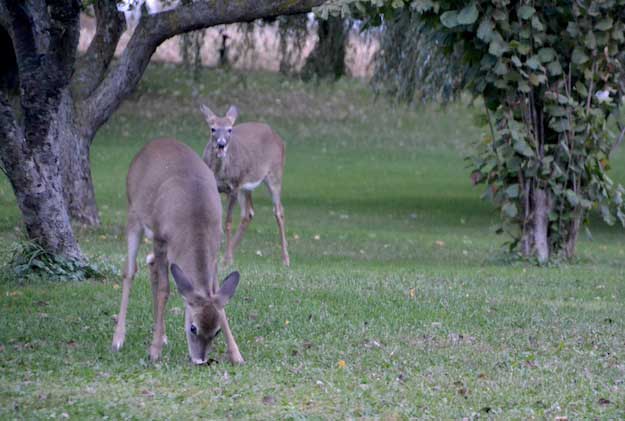AAA urges caution from drivers with car-deer collisions most common in fall months
174 crashes with animals in Orleans County in 2021

File photo by Tom Rivers: These deer are shown by West Barre Road in Barre on Oct. 12, 2018.
Press Release, AAA Western and Central New York
New York drivers need to buck up this fall and watch for animals on the roads. AAA analyzed New York crash data and found that October, November and December are by far the peak months for animal crashes, notably deer, in the Empire State.
There were 34,064 animal-related crashes statewide in 2021 – up slightly from 2020 – that’s equivalent to one animal-related crash every 16 minutes. Of the 34,064 crashes, there were 1,515 injury animal-related crashes and five fatal crashes.
AAA analyzed New York State data, and here are the top 10 counties for animal crashes in 2021:
- Suffolk (1,367)
- Monroe (1,358)
- Orange (1,356)
- Oneida (1,269)
- St. Lawrence (1,260)
- Jefferson (1,217)
- Ontario (1,196)
- Erie (1,008)
- Onondaga (972)
- Livingston (929)
Editor’s Note: AAA reported that for 2021, the number of crashes where “animal’s action” was listed as a contributing factor was 770 in Genesee County and 174 in Orleans County.
Motorists should be especially vigilant after dark as deer crashes often occur outside daylight hours. Crashes are most common near sunset (6 to 8 p.m. before the clock changes, 5-7 p.m. after the clock changes).
“Drivers should always be on the lookout for hazards on the road, but the danger of deer increases every fall,” said Elizabeth Carey, director of public relations at AAA Western and Central New York. “Car-deer collisions can be both deadly and costly. Drivers should pay close attention, avoid distractions and scan the road for deer when traveling on area roadways.”
AAA offers the following tips for avoiding, or mitigating, deer crashes:
1. Scan the road. Especially the shoulders of the road in front of you. Deer may dash out from the shoulder or wooded areas adjacent to the road. They often travel in herds.
2. Follow the speed limit. Keeping your speed down will give you more time to respond to unexpected wildlife movements.
3. Can’t avoid a collision? Apply the brakes firmly and remain in your lane. Swerving sharply to avoid an animal can often cause a more serious crash.



























































